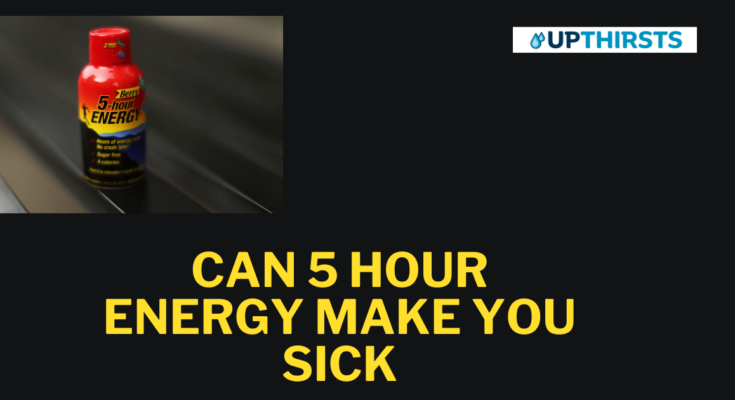Unveiling the Truth: Can 5-Hour Energy Make You Sick?
Introduction:
In our fast-paced world, energy drinks have become a popular choice for those seeking a quick boost to power through the day. Among the myriad options available, 5-Hour Energy stands out for its promise of providing sustained Energy without the jitters associated with other caffeinated beverages. However, an important question lingers in the minds of consumers – can 5-Hour Energy make you sick? This comprehensive article delves deep into the ingredients, potential side effects, and scientific studies to uncover the truth.
I. Understanding 5-Hour Energy:

A. What is 5-Hour Energy?
- Brief history and origin
- Unique selling points
B. Ingredients in 5-Hour Energy:
- Caffeine content
- Amino acids
- B-vitamins
- Other key components
II. The Potential for Adverse Reactions:
A. Caffeine Sensitivity:
- Impact of caffeine on the body
- Identifying caffeine sensitivity
B. Overconsumption Risks:
- Recommended dosage
- Dangers of exceeding recommended limits
C. Allergic Reactions:
- Common allergens in 5-Hour Energy
- Symptoms of allergic reactions
III. Exploring Reported Side Effects:
A. Customer Testimonials:
- Analyzing user experiences
- Common themes in reported side effects
B. Scientific Studies:
- Research on the safety of 5-Hour Energy
- Findings on short-term and long-term effects
IV. Regulatory Oversight:
A. FDA Approval:
- Status of 5-Hour Energy with the Food and Drug Administration
- Regulatory standards for energy drinks
B. Safety Measures:
- Manufacturer’s responsibility
- Consumer awareness and precautions
V. Personal Factors Influencing Tolerance:
A. Individual Variations:
- Genetics and metabolism
- Lifestyle and health considerations
B. Pre-existing Conditions:
- Impact on susceptibility to side effects
- Consultation with healthcare professionals
VI. Mitigating Risks and Ensuring Safety:
A. Responsible Consumption:
- Following recommended guidelines
- Monitoring individual reactions
B. Alternatives to 5-Hour Energy:
- Exploring other energy-boosting options
- Balanced lifestyle choices
Can 5 Hour Energy Make You Sick
When many people need an energy boost at the office, at home or before a workout, they turn to the energy supplement 5 Hour Energy. The 2-ounce energy shot contains a combination of caffeine, B vitamins and amino acids, along with some flavorings and preservatives. Like most energy supplements, however, there is a potential for certain side-effects with 5 Hour Energy. Additionally, the federal Food and Drug Administration has called into question the safety of this supplement.
Niacin Flush
One of the more common side-effects of 5 Hour Energy is what’s known as a niacin flush. According to University of Maryland Medical Center, this reaction normally occurs when 50 milligrams or more of niacin are ingested. The original 5 Hour Energy contains 30 milligrams of niacin, and the extra-strength version contains 40 milligrams. A niacin flush is caused by increased blood flow to the skin and can include burning or tingling sensations in the face and chest and red-flushed skin. One way to reduce this symptom is to take an aspirin about 30 minutes before taking niacin.
Caffeine Content
According to Forbes, one original 5 Hour Energy shot contains between 207 and 215 milligrams of caffeine, which is similar to the amount or caffeine in one 12-ounce cup of coffee. Caffeine is a stimulant that can be used to increase mental focus and fight fatigue; however, for some people it can present side-effects as well. These can include rapid heart beat, sleeplessness, anxiousness, nausea, nervousness, irritability, cold sweats, loss of appetite and diarrhea. Additionally, symptoms of caffeine overdose can include headaches, irregular heart beat, fever, dehydration and even seizures in acute overdoses.
Unknown Effects
“The New York Times” reports that from 2009 to late 2012, the FDA received some 90 filings of serious injury and 13 reports of death that cited the possible involvement of 5 Hour Energy. The filing of an incident report with the FDA does not, however, mean that a product was responsible for a death or injury. On the other hand, these reports do speak to the unknown nature of the possible effects of 5 Hour Energy. Dr. Brent Bauer, Mayo Clinic director of Complementary and Integrative Medicine, said, “These energy shots have over a dozen ingredients all together, and consumers are ingesting them at very high doses, but there is no research of how the ingredients react all together.”
Safety Considerations
5 Hour Energy comes in three different formulas: original, extra strength and decaffeinated. If you’re concerned with the potential side-effects of this energy supplement, consider the decaffeinated version, which also contains no niacin. The manufacturer of this supplement recommends only consuming half a bottle for moderate energy and not does not recommend exceeding two bottles daily. Following these recommendations may help limit any side-effects.
Conclusion:
In conclusion, whether 5-Hour Energy can make you sick is multifaceted. While the beverage has gained popularity for its benefits, consumers must be aware of potential risks and exercise caution. By understanding individual tolerances, following recommended guidelines, and staying informed about the latest research, individuals can make informed decisions about incorporating 5-Hour Energy into their daily routines. Remember, knowledge is power when it comes to your health and well-being.
FAQs
- What is the primary ingredient in 5-Hour Energy that could make someone sick?
-
- Caffeine is the primary ingredient in 5-Hour Energy, which could lead to adverse effects.
- What is the recommended daily dosage of 5-Hour Energy to avoid potential health risks?
-
- The recommended daily dosage of 5-Hour Energy is one bottle per day, and exceeding this limit may increase the risk of adverse effects.
- Can caffeine sensitivity play a role in whether 5-Hour Energy makes someone sick?
-
- Yes, individuals with caffeine sensitivity may experience adverse effects, such as increased heart rate or jitters, after consuming 5-Hour Energy.
- Are there reported cases of allergic reactions to the ingredients in 5-Hour Energy?
-
- While uncommon, some individuals may experience allergic reactions to ingredients in 5-Hour Energy, leading to symptoms like itching, swelling, or difficulty breathing.
- What role does overconsumption of 5-Hour Energy play in potential health issues?
-
- Overconsumption of 5-Hour Energy can lead to an excessive intake of caffeine, resulting in symptoms such as nausea, headaches, and palpitations.
- Has the Food and Drug Administration (FDA) approved 5-Hour Energy, and what does this mean for its safety?
-
- 5-Hour Energy is classified as a dietary supplement and is not directly regulated by the FDA. Consumers should be aware of this when considering its safety.
- Are there any reported long-term health effects associated with regular consumption of 5-Hour Energy?
-
- Scientific studies on the long-term effects of 5-Hour Energy are limited, making it crucial for consumers to be mindful of potential risks and consult healthcare professionals.
- Can factors such as genetics or pre-existing health conditions influence how 5-Hour Energy affects someone?
-
- Individual factors like genetics, metabolism, and pre-existing health conditions can significantly impact how 5-Hour Energy may affect a person.
- What precautions can individuals take to minimize the risk of feeling sick after consuming 5-Hour Energy?
-
- Consumers can minimize risks by adhering to the recommended dosage, being aware of personal tolerance levels, and monitoring for adverse reactions.
- Are there alternatives to 5-Hour Energy that provide an energy boost without the potential for making someone sick?
-
- Yes, there are various alternatives, such as natural energy sources like exercise, a balanced diet, and staying hydrated, which can provide sustainable energy without the potential side effects of energy drinks.

